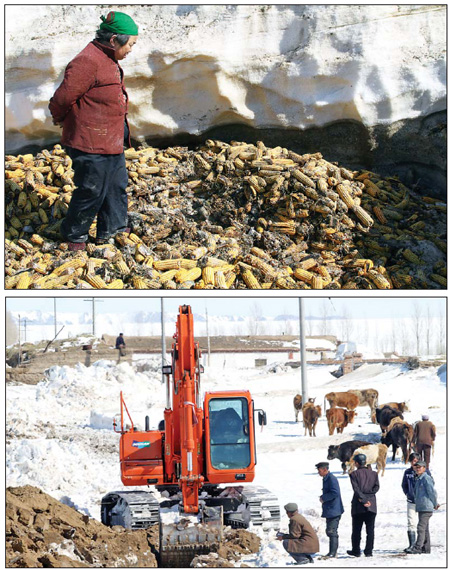Spring thaw poses flood threat
 |
|
Wu Xiuli, who is in her 60s, walks through what is left of her grain supplies in Ahebiedou village, Tuoli county. Her storage shed was destroyed by floods, leaving her corn to go rotten in muddy water. Above bottom: Residents in Wuxuete village watch as a digger clears snow and makes trenches in preparation for the coming floods. |
Nomads settle down
Although farmers have been badly affected, experts warn that herdsmen in Tacheng and Altay, who are mostly from the Kazak ethnic group, are far more vulnerable to extreme weather because of their nomadic lifestyles.
Winter in Xinjiang usually lasts about six months and brings frequent blizzards, meaning its 1.5 million or so herdsmen are forced to move from place to place searching for food and water sources for their livestock.
After this year's snowstorms and floods, the Ministry of Civil Affairs reacted by shipping urgent relief for victims, including 8,000 cotton tents, 20,000 coats, and 20,000 quilts. However, the authorities found it extremely difficult to deliver aid to the herdsmen isolated deep in the mountains.
The Xinjiang government has been working to improve the quality of life of herdsmen since 2004, when it introduced a project to build special residential areas for their families. The move was aimed at allowing them to settle in one place, as well as enable their children to receive proper and continuous education, said officials.
However, many refused the offer because the developments only provided cut-price accommodation for families and did not include room for livestock. Some of the settlements also lacked essential facilities, such as drinking water systems. In response, the regional government revamped the project and in 2007 began to construct residential areas that meet the needs of the herdsmen.
As of the end of last year, 580,000 herdsmen and their families had started new lives in the developments. Authorities plan to settle another 760,000 - more than half of the region's total population - by 2020.
In Qibaerqidie, a newly built residential area in Tacheng, former nomadic herdsmen all have homes equipped with solar electric generators, while their livestock have pens and large stretches of land to forage. The community also has a school and hospital. Each property cost about 25,000 yuan. Families pay about 5,000 yuan, and the rest is shared between the central and regional governments.
While nomadic herdsmen waited weeks for aid during the snowstorms and floods, leading to the death of thousands of sheep and cattle, those in Qibaerqidie were unaffected.
Metgen Karbush, 70, and her family moved into the neighborhood about two weeks ago after growing tired of coping with the harsh conditions in the mountains. The family lost almost half its livestock this winter.
"First came the heaviest snow I've ever seen and then the floods came. We were completely helpless in the mountains," she said while watching satellite television in the warmth of her new home. "I've been a nomadic herdsman since I was born. I always believed it is the way to be but now I regret not moving here earlier."
Karbush and family are among many herdsmen in Tacheng prefecture who have had a change of heart about joining the housing project since the beginning of winter, said officials responsible for the developments.
Although her family cannot afford the house, the government allowed them to move in. "We will pay for it later when we have sold the wool and meat of our livestock," she said.
 0
0 







Go to Forum >>0 Comments